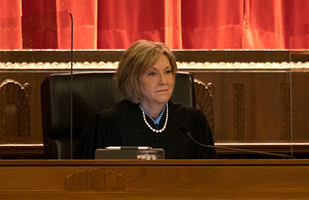Former Lawmaker Hears First Supreme Court Case

Judge Betty Sutton has gone from writing laws as a legislator to interpreting them as a jurist.

Judge Betty Sutton has gone from writing laws as a legislator to interpreting them as a jurist.
A prominent Ohio public servant over the past three decades debuted today as a visiting judge on the Supreme Court of Ohio.
Ninth District Court of Appeals Judge Betty Sutton sat in place of Justice Sharon L. Kennedy, who recused from State ex rel. Hicks v. Clermont County Board of Commissioners.According to the Ohio Constitution, in the event of a justice’s recusal, the chief justice can select any of the 69 Ohio appellate court judges to sit temporarily on the Supreme Court.
“Having worked as a legislator and administrator in the executive branch – all of those things have helped inform me and are useful experiences to bring to the bench to make sure that we do fulfills the function of an independent judiciary,” said Judge Sutton.
Judge Sutton began serving the Ninth District – representing Lorain, Medina, Summit, and Wayne counties – in February 2021. Prior to joining the bench, the youngest woman ever elected to the Ohio House of Representatives spent three decades as an attorney in government and private practice. Judge Sutton remains the only Ohioan to work as a legislator at the city, county, state, and federal levels.
“I feel that every step to this moment, this place, has prepared me to serve the public in this capacity,” said Judge Sutton. “I learned how to write the laws, and I had experience in implementing the laws. That provided me a background to know how the interpretation of those laws as written should take place.”
At the appellate court, Judge Sutton hears appeals from trial courts as well as initial requests for certain court orders.
In the case she heard today, the parties debated whether a citizen must prove that a government entity violated the Ohio Open Meetings Act by withholding public information during closed-door meetings. A Clermont County resident filed the lawsuit in 2018 after the county’s board of commissioners held multiple executive sessions without disclosing what was discussed in private.

